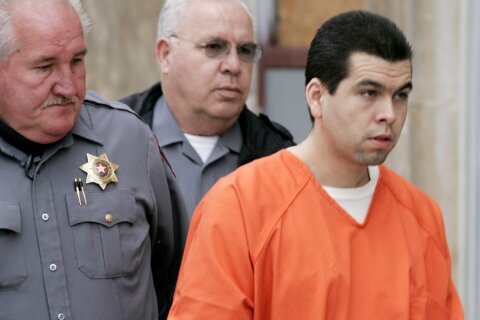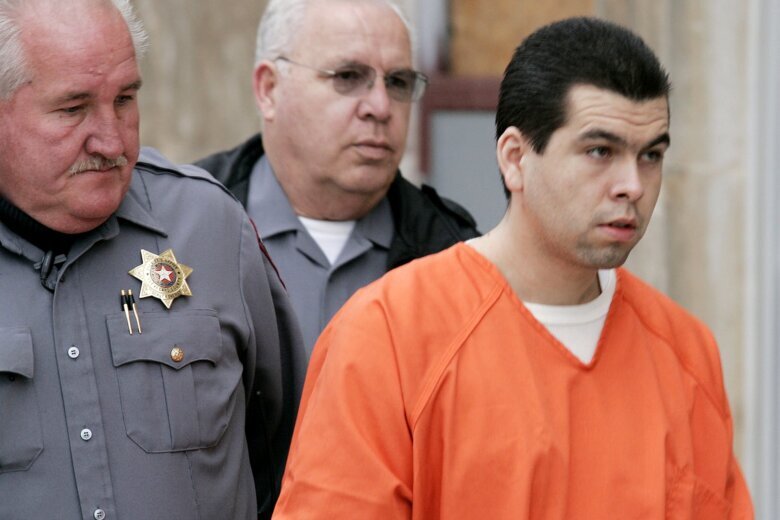
OKLAHOMA CITY (AP) — A man scheduled to be executed in September for the 1996 killing of a University of Oklahoma dance student plans to reject his chance for a clemency hearing, saying there is little hope the state’s Republican governor would spare his life.
Anthony Sanchez, 44, said in a telephone interview with The Associated Press on Thursday from Oklahoma’s death row that even in the rare case when the five-member Pardon and Parole Board recommends clemency, Gov. Kevin Stitt is unlikely to grant it.
“I’ve sat in my cell and I’ve watched inmate after inmate after inmate get clemency and get denied clemency,” Sanchez said. “Either way, it doesn’t go well for the inmates.”
Sanchez cited the recent cases of Bigler Stouffer and James Coddington, both of whom were executed after the board voted 3-2 for clemency that was later rejected by Stitt.
“They went out there and poured their hearts out, man,” Sanchez said. “Why would I want to be a part of anything like that, if you’re going to sit there and get these guys’ hopes up?”
“Why wouldn’t I try to prove my innocence through the courts,” he added.
Stitt granted clemency to a condemned inmate once, commuting Julius Jones death sentence in 2021 to life in prison without parole. Jones’ case had drawn the attention of reality television star Kim Kardashian and professional athletes with Oklahoma ties, including NBA stars Russell Westbrook, Blake Griffin and Trae Young, and NFL quarterback Baker Mayfield. All of them urged Stitt to commute Jones’ death sentence and spare his life.
Sanchez, who maintains his innocence, said he is no longer working with his court-appointed attorneys, but Mark Barrett, who represents Sanchez, said he was appointed by a federal judge.
“If we’d been hired and the client didn’t want us anymore, that would be the end of it,” Barrett said. “When there is an appointment, the judge has to release you from your appointment.”
The Oklahoma Court of Criminal Appeals in April rejected a request from Sanchez’s attorneys for an evidentiary hearing in which they claimed Sanchez’s late father, Thomas Glen Sanchez, was the actual killer of 21-year-old Juli Busken.
Busken, from Benton, Arkansas, had just completed her last semester at OU when she was abducted on Dec. 20, 1996, from her Norman apartment complex. Her body was found that evening. She had been raped and shot in the head.
The slaying went unsolved for years until DNA recovered from her clothes linked Anthony Sanchez to the crime. He was convicted of rape and murder and sentenced to die in 2006.
A private investigator hired by an anti-death penalty group contends the DNA evidence may have been contaminated and that an inexperienced lab technician miscommunicated the strength of the evidence to a jury.
But former Cleveland County District Attorney Tim Kuykendall has said there was other evidence linking Anthony Sanchez to the killing, including ballistic evidence and a shoe print found at the crime scene.
“I know from spending a lot of time on that case, there is not one piece of evidence that pointed to anyone other than Anthony Sanchez,” Kuykendall said. “I don’t care if a hundred people or a thousand people confess to killing Juli Busken.”
Oklahoma resumed carrying out the death penalty in 2021, ending a six-year moratorium brought on by concerns about its execution methods.
Oklahoma had one of the nation’s busiest death chambers until problems in 2014 and 2015. Richard Glossip was hours away from being executed in September 2015 when prison officials realized they received the wrong lethal drug. It was later learned the same wrong drug had been used to execute an inmate in January 2015.
The drug mix-ups followed a botched execution in April 2014 in which inmate Clayton Lockett struggled on a gurney before dying 43 minutes into his lethal injection and after the state’s prisons chief ordered executioners to stop.
___
Follow Sean Murphy on Twitter: @apseanmurphy
Copyright © 2024 The Associated Press. All rights reserved. This material may not be published, broadcast, written or redistributed.







